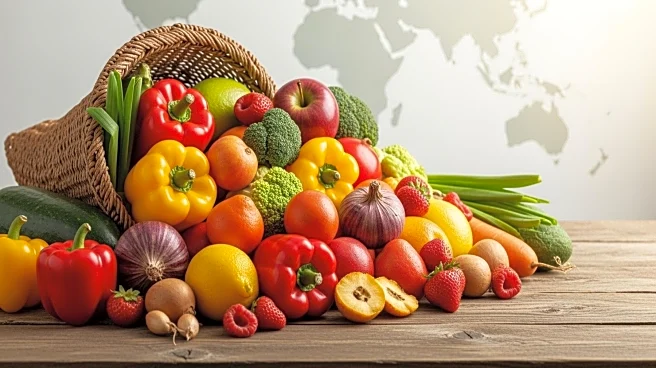What's Happening?
The Federal Government of Nigeria, in collaboration with international organizations and private stakeholders, is taking significant steps to boost agricultural development and ensure food security. This
initiative was highlighted during the Ministerial Press Briefing for the 2025 World Food Day celebration, led by the Minister of State for Agriculture and Food Security, Sen. Aliyu Abdullahi. The theme for this year's celebration is 'Hand-in-Hand for Better Foods and a Better Future.' The government aims to strengthen Nigeria's agricultural sector through partnerships with the Food and Agriculture Organisation (FAO) of the United Nations and other critical stakeholders. These efforts are part of a broader strategy to eradicate hunger and create a sustainable future for Nigerians. The minister emphasized the importance of collective action in addressing global hunger and food crises, urging national governments to ensure food accessibility for their citizens.
Why It's Important?
This initiative is crucial as it addresses the pressing issue of food security, which is a significant concern globally and particularly in Nigeria. By collaborating with international organizations like the FAO, Nigeria is positioning itself to tackle hunger and malnutrition effectively. The focus on sustainable agriculture and increased productivity is expected to improve livelihoods and contribute to economic growth. The involvement of various stakeholders, including private entities and development agencies, highlights the importance of a multi-faceted approach to solving food-related challenges. This collaboration could serve as a model for other countries facing similar issues, demonstrating the potential of international solidarity in combating hunger.
What's Next?
The Nigerian government plans to continue implementing policies and programs aimed at transforming the agricultural sector. This includes increasing productivity and improving the livelihoods of farmers. The World Food Day celebration serves as a platform to raise awareness about food security and nutrition, encouraging public and private sectors to contribute to these efforts. The distribution of agricultural inputs to beneficiaries, including young farmers and cooperative societies, is a step towards empowering local communities and promoting self-sufficiency. The government is also calling on Nigerians to support initiatives that provide sustainable solutions to hunger and food waste.
Beyond the Headlines
The emphasis on inclusive agribusiness growth reflects a broader trend towards sustainable development and self-reliance in agriculture. By focusing on local production and consumption, Nigeria aims to reduce its dependency on food imports, which can be vulnerable to global market fluctuations. This approach not only addresses immediate food security concerns but also contributes to long-term economic stability and resilience. The initiative also highlights the role of education and awareness in driving change, as seen in the involvement of young farmers and the emphasis on learning about global food challenges.











